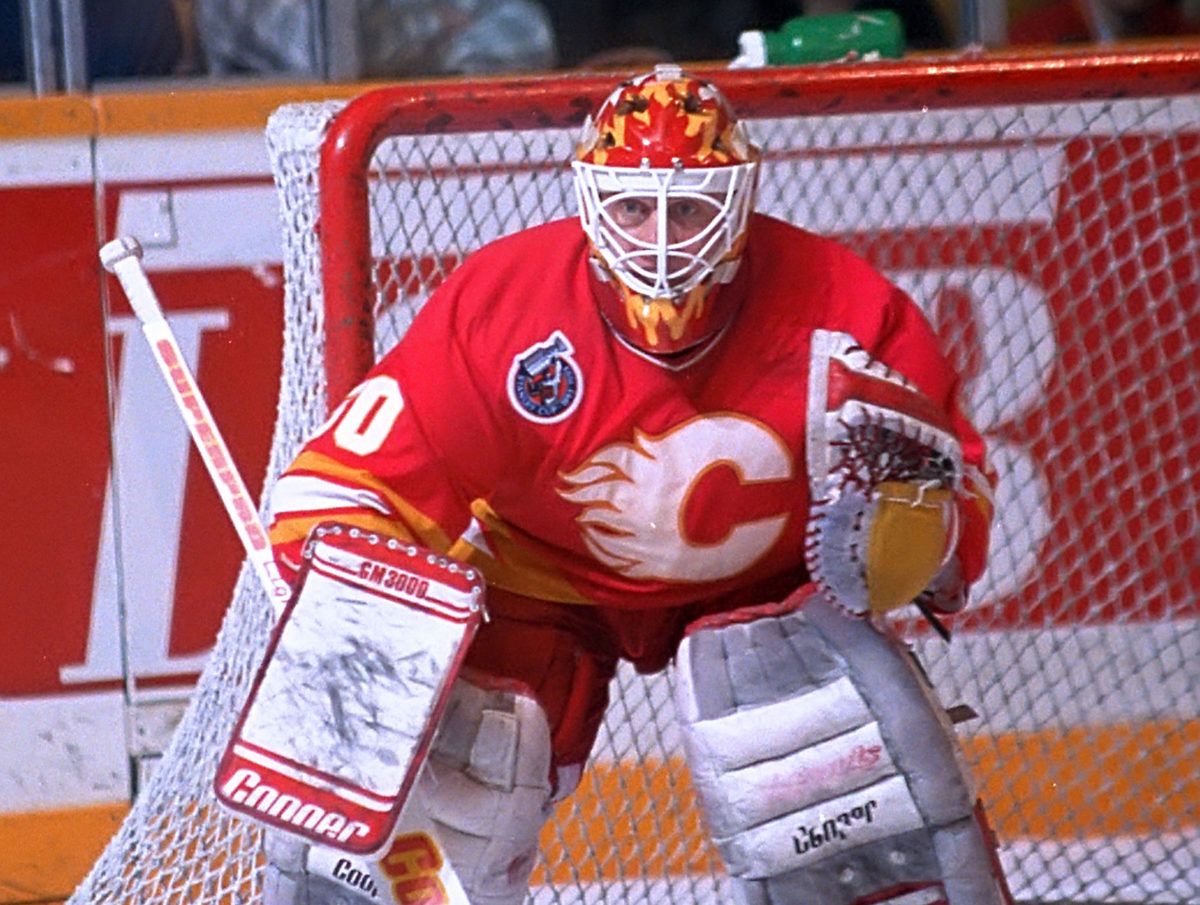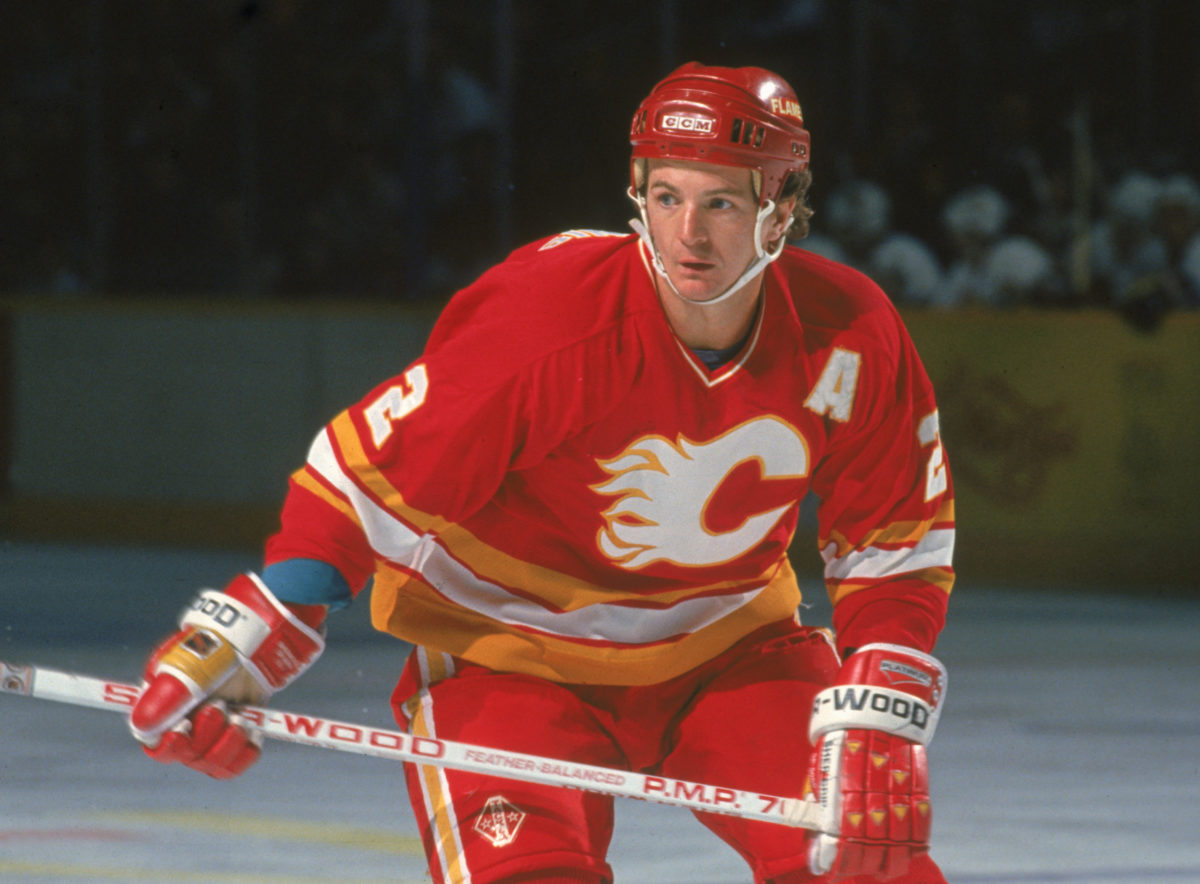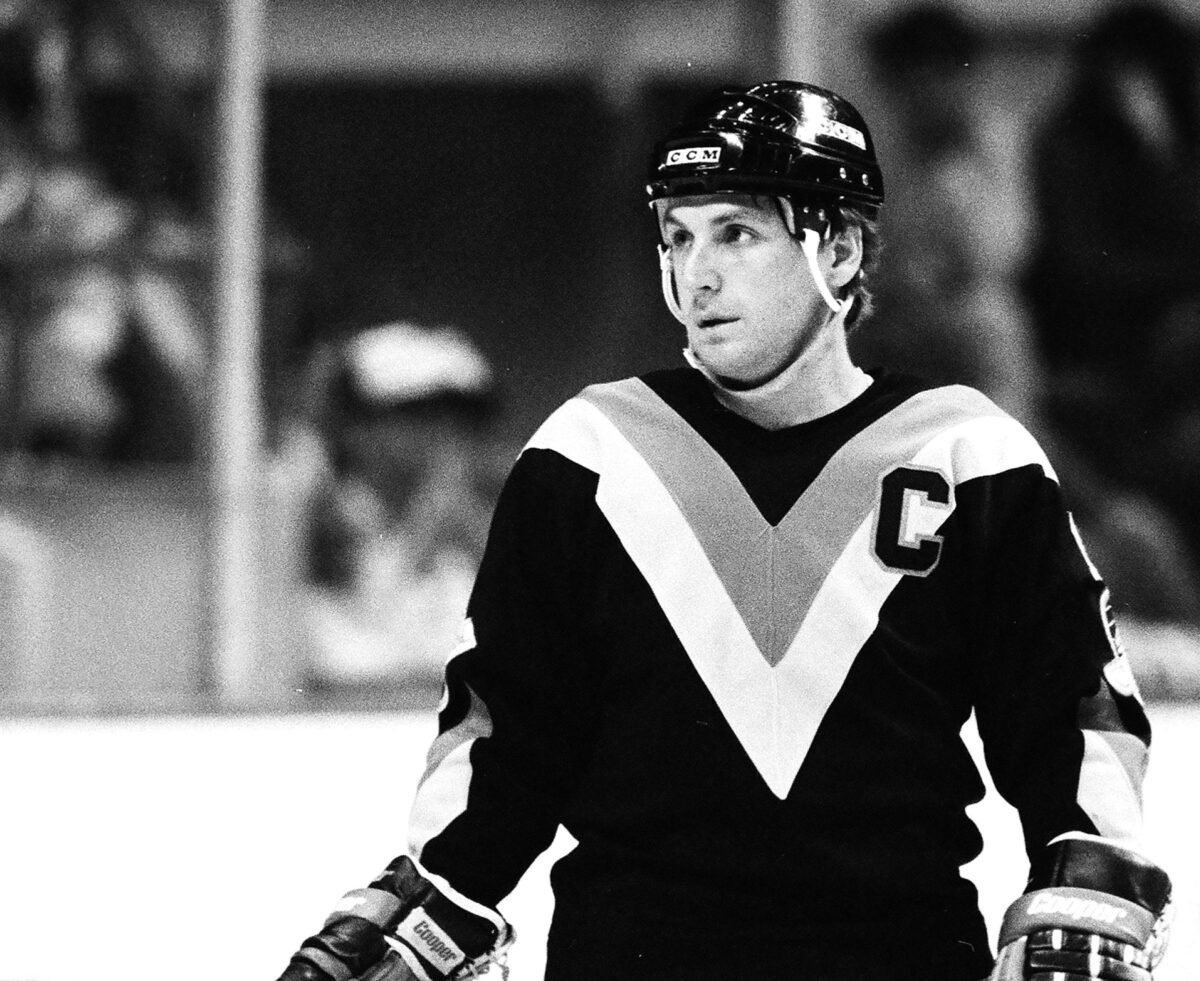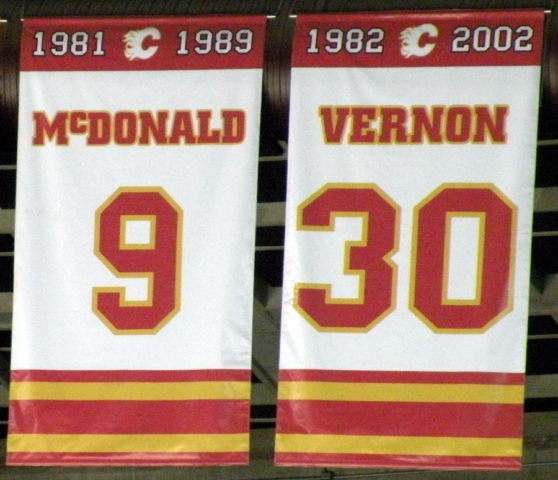Mike Vernon played his first game with the Calgary Flames on Dec. 12, 1982, against the Detroit Red Wings. It was an utter disaster. The 19-year-old goaltender gave up six goals in the first two periods before he was pulled. After that night, no one would have predicted that he would become one of the greatest netminders in franchise history.
Making it in the NHL
Remembering that experience in an interview with the Canadian Broadcasting Corporation, Vernon said that, as he skated to the Flames bench, he asked himself, “How am I ever going to play in the NHL?” When he found himself back with his junior club in the Western Hockey League and was thinking about quitting, he thought of what his father told him: “If you don’t give it your all, and if you don’t give it another good shot, you may regret this for the rest of your life.”
Vernon gave it his all and was eventually called back up to the big club for the 1985-86 season. His performance in 21 regular-season games earned him the starting position in the playoffs against the Winnipeg Jets. At 23 years old, he led the Flames to four straight victories against the Jets and on to convincing wins against the Edmonton Oilers and St. Louis Blues.

Vernon and the Flames lost to the Montreal Canadiens in the Stanley Cup Final, but that series and the 1986 Playoffs set the tone for what would arguably become not only the greatest season in Flames’ history but that of the young goalie’s career three years later.
Vernon Sets Stage for Flames’ 1988-89 Stanley Cup Run
During the 1988-89 season, Vernon and his backup, Rick Wamsley, backstopped the Flames’ smothering defence, which general manager Cliff Fletcher believed was key to success in the NHL at that time. Vernon registered one of the lowest goals-against averages (GAA) in the league at 2.65.
Legendary goaltenders always seem to have a great team in front of them and Vernon was no exception. The Flames’ roster included a parade of future Hockey Hall of Famers, including Lanny McDonald, Al MacInnis, Doug Gilmour, Joe Nieuwendyk and Joe Mullen. Rounding out the team were other Flames greats, like Hakan Loob, Gary Suter, Joel Otto and Theo Fleury. Fletcher declared this team to be the best he had ever assembled.

The Flames racked up an astonishing 54-17-9 record to join the Canadiens, Boston Bruins, Philadelphia Flyers and Oilers as the only teams to have won more than 50 games in a season. They were also almost unbeatable at home winning 32 of 40 games.
None of this would have been possible without Vernon putting on an acrobatic show every night. He logged an unbelievable 37-6-5 record and although his 2.65 GAA doesn’t seem impressive by today’s standards, this was during a high-scoring era.
The 1989 Playoffs
Heading into the 1989 Playoffs, Calgary had won the Presidents’ Trophy two seasons in a row. However, it was little consolation for fans who had watched their team lose in the Cup Final three years before, but were also swept by Wayne Gretzky’s Oilers in the Division Final in 1988.
The smart money was on the Flames to win the Cup. They were expected to roll over the lowly Vancouver Canucks in the Smythe Division Semifinal. The Canucks finished 43 points behind Calgary and had more losses than wins. But the Flames were complacent, something that many Presidents’ Trophy winners become against lesser teams in the playoffs. The Men in Red seemed as self-satisfied as the Canucks were lean and hungry after battling for a playoff spot.
Related: Top 3 All-Time Flames Goalies
Calgary gave up the first game after a lacklustre performance but came roaring back to take the next two. Vancouver tied the series in Game 4, then gave up the fifth game but won convincingly in Game 6 to force a seventh game.
In the final tilt, the two teams fought to a draw by the end of regulation. The prospect of sudden death drove them both to the limit, and the furious pace and end-to-end action forced both goaltenders to make breathtaking saves in overtime. None were more spectacular than Vernon’s glove save on Canucks captain Stan Smyl’s breakaway. That save defined Vernon and is still called “the save that won the Cup.”

Al MacInnis, who was named the Conn Smythe Trophy winner as the most valuable player of the 1989 Playoffs, said of Vernon’s performance: “When you look back at the Vancouver series, Mike Vernon stood on his head for us in overtime. If it weren’t for him, we wouldn’t be here today.”
With under a minute to go in overtime, Jim Peplinski fired a wide-angle shot on the Vancouver wicket that was redirected off Otto’s skate and into the net, to win the series for the Flames. However, much of the credit for the win went to Vernon who stopped 42 of 45 shots.
No other series in the playoffs would prove to be tougher than that first-round series against the Canucks. They breezed to a Stanley Cup victory without playing another seventh game, prevailing over the Los Angeles Kings 4-0, the Chicago Blackhawks 4-1 and the Canadiens 4-2.
You may also like:
- NHL Rumors: Ducks, Canucks, Bruins, Flames, Blues
- 2022 NHL Free Agency: Best Restricted Free Agents Remaining
- Flames Arbitration With Tkachuk Could Lead to Big Trade With Blues
- Maple Leafs Face Long Odds to Acquire Matthew Tkachuk
- Flames Filing for Arbitration with Tkachuk is a Very Bad Sign
The Final against the Habs was a goaltending duel as Vernon evened the score against his former rival Patrick Roy who won the Cup against the Flames three years earlier. The icing on the cake was winning the Cup in the storied Montreal Forum, the first and only club to ever do that.
Vernon played 22 games in the playoffs with only five losses, a 2.26 GAA and a .905 save percentage. During the regular season, he led all goaltenders in wins (37), was named to the Second All-Star Team and finished behind Roy for the Vezina Trophy.
The Measure of Mike Vernon
After nine seasons in Calgary, Vernon played another eight seasons with the Detroit Red Wings, San Jose Sharks and Florida Panthers before returning to end his career with the Flames in the 2000-01 season. He retired after the 2001-02 season.
In that time, he won another Stanley Cup and the Conn Smythe Trophy with the Red Wings in 1997. He and Chris Osgood won the William M. Jennings award for allowing the fewest goals against in a season. In his career, he played in five NHL All-Star Games.
Almost all of Vernon’s records were smashed by fellow Flames great Miikka Kiprusoff, but, as good as he was, he never won the Conn Smythe or a Stanley Cup. Vernon appeared in four Stanley Cup Finals and won two.
Related: One for the Ages: Miikka Kiprusoff’s 2005-06 Season
Vernon wrote one of the greatest chapters in Flames’ history, and the organization acknowledged that by retiring his number in 2007. It hangs alongside those of Lanny McDonald and Jarome Iginla.

Now, we’re just waiting for Vernon to be inducted into the Hall of Fame. During his career, he was statistically better than Grant Fuhr and almost equal to Roy, both of whom are inductees (from “Snubbed: The Hall of Fame case for Mike Vernon,” The Athletic, 14/05/2020). Unfortunately, inductions from the goaltending fraternity are as whimsical as they are few. Of 284 members, only 38, or about 13%, are netminders. The debate on Vernon’s inclusion will not be settled here, but it will continue as long as Calgary fans feel he has not received his ultimate due.
LA Kings goaltending great Kelly Hrudey said it best when he made the case for Vernon: “I thought he was one of the most dominant goalies when he played. With his record in big games, the two Stanley Cups, the Conn Smythe – he’s more than earned it, especially when you consider all the other names of people (chosen for the Hall). I’m not taking anything away from the likes of Ed Balfour and others, but Mike’s in the same category. He just is. There’s no denying it.”

